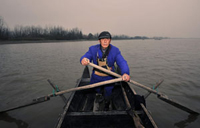Cultural parks no substitute for talent
In the United Kingdom, where the concept of the "creative industry" was first defined in 1998, creative power and intellectual property are the most significant elements of the cultural industry. Although the government plays an important role in its development, its focus is on building the industry's creative potential.
|
|
| Guardian of birds |
|
|
| International garden expo ready to bloom |
For instance, the UK government has established many non-profit professional organizations to offer finance and advice to creative enterprises. These organizations also impart training to people to identify and develop talent. The government also provides the basic industry support, from regional development strategies to policies to boost exports of cultural products, thereby resolving many practical issues that have arisen in the development of the industry.
The United States administration seeks to create a good environment for its cultural industry. For example, it promotes financial investment to support the industry and trains professionals to manage it. More than 30 universities in the US offer such courses.
All these make it imperative for the Chinese government to change its role and focus on the cultivation of talent. Local governments, on their part, should provide a platform to attract resources, such as specialized private funds, for the cultural industry.
Furthermore, the central government should establish a comprehensive system to protect intellectual property rights and promote awareness among Chinese people about copyrights, trademarks and patents, which are key to the cultural industry's successful development.
Only when creative talent and creative companies work together, preferably at the same location, should the authorities consider building a cultural industrial park.
The author is a reporter with China Daily.
E-mail: zhujin@chinadaily.com.cn.


















